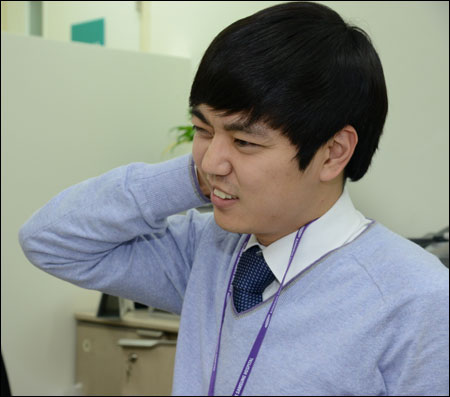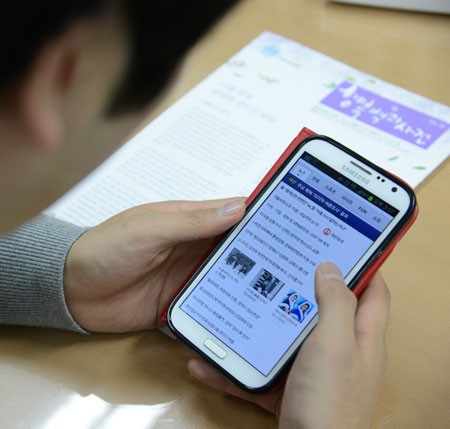Smartphones pose health risks
Dry eyes, turtle neck syndrome on rapid rise
If you look at people on a subway train or bus, over half of them are generally concentrating on smartphones. The number of smartphone users reached 30 million here only three years since the devices were introduced. They now account for 58 percent of total mobile service subscriptions.
However, smartphone use is changing people’s postures because they are now leaning forward regularly to concentrate on the small screens. People are especially likely to do so at this time of year because they spend more time indoors due to the cold weather.
Kim Ji-sang, an office worker who has been using a smartphone since they were launched, spends around four to five hours a day using his device for diverse activities such as surfing the Internet, playing games and even watching movies when at home. However, he suddenly felt severe pain in his shoulders and visited a clinic. The doctor diagnosed him with “turtle neck syndrome” or forward head posture. Doctors point out that excessive use of smartphones can incur multiple health problems. Ophthalmology professor Choi Chul-young, professor Yoon Kyung-jae who specializes in rehabilitation, and professor of psychiatry Shin Dong-won at Kangbuk Samsung Hospital have suggested ways for people to stay healthy while enjoying the smart life.

Excessive smartphone use is causing health problems, including “turtle neck syndrome.” / Courtesy of Kangbuk Samsung Hospital
—Rest your eyes from time to time
As people concentrate on the small screens of smartphones, they blink less. This can cause sore eyes, or irritation that is usually accompanied by dry eyes. Their eyes become blood-shot and people sometimes suffer headaches in the most serious cases.
“We usually blink between 15 to 20 times a minute but this figure decreases to five or seven when focusing on a smartphone screen, causing the eyes to become drier. This is especially so on subways or buses where there is rolling from the constant motion,”Choi said.
He recommended gazing into the distance for a couple of minutes from time to time and decreasing the use of smartphones. Eye drops can also be helpful.
—Stretch neck and shoulders
Looking down at a smartphone for a long time can cause neck strain. In particular, office staff who look at computer monitors at work and smartphone screens outside spend too much time looking downward. This may cause forward head posture, in which continuous strain is put on the neck and shoulders causing pain. If untreated for a long time, the pain can become chronic.
Yoon says that one should avoid bending their head down for a long time. People should also flex their shoulders and straighten their neck. They are also recommended to take 10 minutes’ rest in every hour, stretching their neck and shoulders.
—Don’t give smartphones to children
The frontal lobe of our brain interprets stimulation to the body and processes information. According to Shin, however, the stimulation from smartphones doesn’t go through this process in the frontal lobe. It just induces direct reactions. Hence, too much smartphone use can impair thinking skills or erode people’s patience.
“This isn’t limited to adults. It is in fact more serious among small children. In the case of children, smartphones can interfere with their normal development during a time when they should be learning patience,” the professor said. He added that parents of small children should give a second thought before buying smartphones for them. <The Korea Times/Yoon Ja-young>

























































